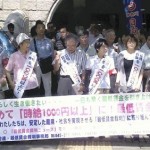Reverse Phenomenon Issue in Japan
 You can’t live on minimum wage-As the number of minimum wage workers increases, the standard has become a problem. In particular, criticisms against what’s called “reverse phenomenon” has become strong. “Reverse phenomenon” refers to the situation in which people working on minimum wage end up making less than people who are supported by government welfare. While the poverty becomes more common among today’s generation in Japan, it is essential to consider the improvement of workers’ basic living standard.
You can’t live on minimum wage-As the number of minimum wage workers increases, the standard has become a problem. In particular, criticisms against what’s called “reverse phenomenon” has become strong. “Reverse phenomenon” refers to the situation in which people working on minimum wage end up making less than people who are supported by government welfare. While the poverty becomes more common among today’s generation in Japan, it is essential to consider the improvement of workers’ basic living standard.
A 26-year-old man says he can’t see the future prospect and since he is too busy making a living, all he looks forward to is to sleep. He works in a traffic guidance and works in day-rate system. His monthly income is between 10,000 yen and 15,000 yen and if you work on minimum wage in Tokyo, you can make about 12,5000 and it’s about the same.
In order to save money, he uses the meal services provided by a non-profit organization once a day. He does not use an air conditioner and buys second-hand clothes and cuts his hair on his own. He does not go drinking and has not been paying his social insurance. His final degree is middle school so cannot find a stable job. His pay is almost the same as those of welfare collectors so he is not motivated to work.






